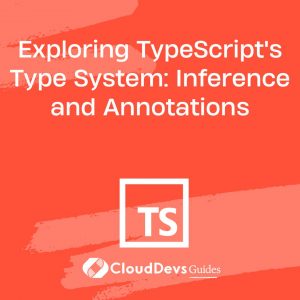Exploring TypeScript’s Type System: Inference and Annotations
TypeScript, a superset of JavaScript, has gained immense popularity among developers for its ability to add static typing to JavaScript code. One of its key features is its powerful type system, which provides developers with enhanced tooling, better code completion, and improved error checking. In this blog post, we will explore two essential concepts of TypeScript’s type system: type inference and type annotations. Understanding how these work and when to use them can greatly enhance your TypeScript programming skills and make your code more robust and maintainable.
Type Inference: Unveiling TypeScript’s Magic
Type inference is one of the most fascinating aspects of TypeScript. It allows the compiler to automatically determine the types of variables based on their usage and context, without the need for explicit type annotations. Let’s dive into a simple example:
typescript let name = "John"; name = 42; // Error: Type '42' is not assignable to type 'string'
In the above code snippet, TypeScript infers the type of the name variable as string based on its initial assignment. Consequently, if we try to assign a number to it, the TypeScript compiler raises a type error. This early detection of type errors during compilation saves valuable debugging time and prevents potential runtime issues.
Type inference works not only with primitive types but also with complex types like arrays and objects:
typescript
const numbers = [1, 2, 3];
const person = { name: "Alice", age: 25 };
numbers.push("four"); // Error: Argument of type '"four"' is not assignable to parameter of type 'number'
person.salary = 5000; // Error: Property 'salary' does not exist on type '{ name: string; age: number; }'
Here, TypeScript infers the type of the numbers array as number[] and the type of the person object as { name: string, age: number }. Consequently, any attempt to add an incompatible value or access a non-existent property results in a compile-time error.
Type Annotations: Providing Explicit Type Information
While type inference is powerful, there are times when we need to explicitly specify types, especially for cases where inference is not possible or when we want to add clarity to our code. This is where type annotations come into play.
Type annotations enable developers to explicitly declare the types of variables, function parameters, and return values. Let’s consider an example:
typescript
function multiply(a: number, b: number): number {
return a * b;
}
const result = multiply(5, 3);
console.log(result); // Output: 15
const invalidResult = multiply("hello", 3); // Error: Argument of type '"hello"' is not assignable to parameter of type 'number'
In the above code snippet, the multiply function has type annotations for its parameters (a and b) as well as for its return value. By providing explicit type information, we ensure that the function accepts only numeric arguments and returns a numeric result. This helps catch potential errors at compile-time and improves code readability and maintainability.
Type annotations are not limited to just functions; they can also be used for variables and class members:
typescript
let age: number;
age = 25;
class Person {
name: string;
age: number;
constructor(name: string, age: number) {
this.name = name;
this.age = age;
}
}
In the above example, the variable age is explicitly annotated as a number. Similarly, the name and age properties of the Person class are annotated as string and number, respectively. These annotations provide clear guidance about the expected types and help prevent accidental misuse or type errors.
Type Inference vs. Type Annotations: When to Use Which?
Knowing when to rely on type inference and when to use type annotations is crucial for effective TypeScript programming. In general, type inference should be the default approach as it reduces the need for explicit type annotations and improves code readability. However, there are scenarios where type annotations are necessary:
1. Ambiguous or complex types: Type inference may struggle with complex scenarios or situations where the type cannot be easily inferred. In such cases, explicit type annotations can provide clarity to both the developer and the compiler.
2. Public APIs and libraries: When building public APIs or libraries, type annotations are essential for providing clear documentation and ensuring that consumers of the API understand the expected types and interfaces.
3. Collaboration and maintainability: Explicit type annotations can greatly assist in collaborative development, as they provide a clear understanding of the types and interfaces used in the codebase. They also make the code more maintainable by enabling future developers to quickly grasp the purpose and usage of variables, functions, and classes.
Conclusion
TypeScript’s type system, with its powerful type inference and type annotations, empowers developers to write more robust and error-free code. Type inference automates the process of determining types, allowing for early detection of potential errors during compilation. Type annotations provide clarity and documentation, ensuring that code is self-explanatory and easier to understand for both developers and consumers of APIs.
By understanding the nuances of type inference and type annotations and knowing when to use each approach, developers can leverage TypeScript’s type system to its fullest potential. This results in code that is not only type-safe but also more maintainable, readable, and scalable. Embrace the magic of TypeScript’s type system and take your JavaScript development to the next level!
Table of Contents









